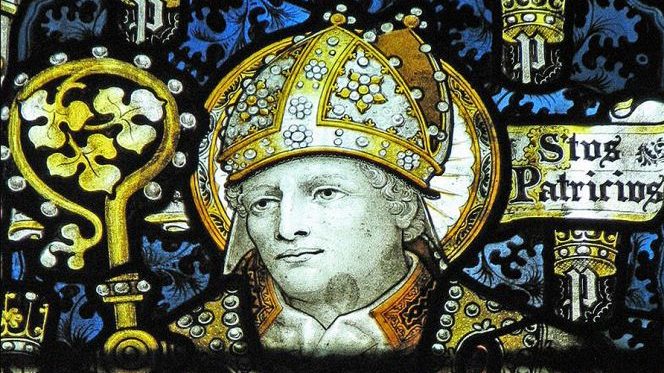This Saint Patrick’s Day is a time for prayer and action for peace in Ukraine and for all the refugees and other victims of the war, Ireland’s leading Roman Catholic and Church of Ireland archbishops have said in a joint statement.
“We appeal through our prayers this Saint Patrick’s Day for an end to this pointless massacre and pulverizing of the property, bodies and spirit of the Ukrainian people,” Catholic Archbishop Eamon Martin of Armagh, and Church of Ireland Archbishop John McDowell said in a joint March 16 statement on the eve of the Feast of St. Patrick, Ireland’s primary patron saint.
“It is poignant to think that as the world comes out of a global pandemic which reminded us so strongly of our connectedness and interdependence, that our continent has so easily lapsed into the pointless divisions and devastation of warfare,” they continued. “War is a defeat for humanity. It represents the failure of politics, diplomacy and dialogue.”
“May all Christians of Europe, including Patriarch Kirill and the Russian Orthodox Church, unite in daily spiritual and practical efforts in support of a ceasefire, humanitarian outreach and the immediate laying down of weapons. Christ’s cause can only be advanced by Christ’s means,” the archbishops said.
Both churchmen hold the title of Primate of All Ireland in their respective church bodies. Each considers its respective Archbishop of Armagh to be the successor of St. Patrick, the fifth century Catholic saint and missionary credited with the evangelization of Ireland. Patrick had been captured from Romanized Britain and brought to Ireland by slave raiders. He worked for years as a slave before his escape and later returned to serve the small Christian communities of Ireland and to convert its pagan peoples to Christianity.
Before issuing their joint statement, Martin and McDowell led the annual St. Patrick’s lecture and discussion at the Market Place Theatre and Arts Centre in Armagh, Northern Ireland. The annual event focuses on the witness of St. Patrick in the modern world.
“Tradition tells us that Saint Patrick himself, in the face of great danger and peril to his own life, prayed his ‘Breastplate Prayer,’ taking comfort in his faith that God does not forsake us, and that Christ is present with all who suffer: Christ is always with us, behind us and before us,” Martin and McDowell said.
The two archbishops encouraged Christians in Ireland and the Irish diaspora “to be inspired by the life and witness of Saint Patrick to be reconcilers and peacemakers.”
The archbishops said it would be “unconscionable” to celebrate the Feast of Saint Patrick “without offering the solidarity of our prayers, charity and welcome for the people of Ukraine.”
The bishops prayed for Ukrainians in Ireland and for their families and friends trapped at home.
“We join our small Lenten sacrifices with their immense suffering. We also acknowledge the many Russian people, here and in their homeland, who bear no responsibility for this heart-breaking situation and who share our desire for peace and an end to this terrible violence.”
Martin and McDowell found encouragement that Christians and others in Ireland are “instinctively reaching out” to support humanitarian efforts, especially those forced to flee their homelands.
The life of St. Patrick shows he would be sympathetic.
“At a young age Saint Patrick was captured and trafficked to these shores – no doubt frightened, disoriented, distressed and fearful for his life. In the opening words of his ‘Confession,’ he describes how he and others ‘were scattered among many nations’,” said the archbishops.
“So too the thousands of refugees arriving in Ireland must feel scattered amongst the nations. We pray that our land of welcomes will continue to offer compassionate respite to our sisters and brothers in their time of need.”
“This is the light of the Gospel shining through the darkness: the outpouring of prayer, charity and solidarity across Ireland towards the people of Ukraine has been heartening.”
They praised the generosity of individuals and parish communities in establishing connections with charitable projects in Ukraine and in bordering countries to help refugees and those remaining in Ukraine.
“The tragedy of what we are witnessing in Ukraine during these days impels us again here in Ireland to work for a genuine human fraternity as the only way to resolve differences and conflicts.”
Reflection in Ireland on the current events of Europe has lessons for Ireland’s own peace process, Martin and McDonald said. Specifically, they noted “the importance of never taking our progress in peace for granted, never giving up on dialogue and the building of bridges and mutual understanding across historical divides.”
Ireland recently marked 50 years since Bloody Sunday, when unarmed Catholic civil rights demonstrators in Northern Ireland were fired upon by British soldiers, killing several. The incident was a watershed moment in The Troubles, a period of violent conflict split along Catholic and Protestant lines in Northern Ireland. It ended with the Good Friday Agreement of 1998.
Ireland is also marking the centenary of the Irish Civil War, fought between two nationalist factions over the Anglo-Irish Treaty. That treaty partitioned the six counties of Northern Ireland but put what is now the Republic of Ireland on a path to independence from the United Kingdom.

